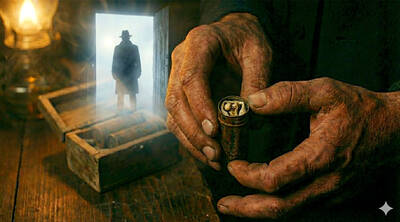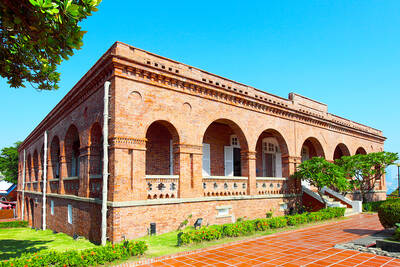Jeremiah Heaton was playing with his daughter in their Abingdon, Virginia home last winter when she asked whether she could be a real princess.
Heaton, a father of three who works in the mining industry, didn’t want to make any false promises to Emily, then 6, who was “big on being a princess,” but he still said yes.
Within months, Heaton was journeying through the desolate southern stretches of Egypt and into an unclaimed 207,200-hectare patch of arid desert.

Photo: AFP
照片:法新社
There, on June 16 — Emily’s seventh birthday — he planted a blue flag with four stars and a crown on a rocky hill. The area, a sandy expanse sitting along the Sudanese border, morphed from what locals call Bir Tawil into what Heaton and his family call the “Kingdom of North Sudan.”
There, Heaton is the self-described king and Emily is his princess.
“I wanted to show my kids I will literally go to the ends of the Earth to make their wishes and dreams come true,” Heaton said.
(Courtesy of Liberty Times)
去年冬天,耶利米.希頓在位於維吉尼亞州艾賓頓的自宅與女兒玩耍時,女兒問他,她能否成為真正的公主。
有三個小孩、任職礦業的希頓,不想對當時六歲、「真的很想當公主」的艾蜜莉,許下虛假的承諾,但他還是答應女兒了。
用好幾個月的時間,希頓穿過埃及南部的廣袤荒地,來到一塊面積二十萬七千兩百公頃的無主不毛沙漠。
六月十六日,也就是艾蜜莉七歲生日當天,他在那塊土地的一座石丘上,插上一面有四個星星與一個皇冠圖案的藍色旗幟。這塊沿著蘇丹邊界的廣闊沙地,就此從當地人口中的比爾泰維勒,搖身一變成為希頓及其家人所稱的「北蘇丹王國」。
希頓在此自立為王,艾蜜莉就是他的公主。
希頓說:「我要讓我的孩子們知道,我真的會拚了老命實現他們的希望與夢想。」
(自由時報提供/翻譯:張沛元)

★ Bilingual Story is a fictionalized account. 雙語故事部分內容純屬虛構。 The fog came before the knock. It covered the street and pressed against the window. Chao Gung-dao lit a small oil lamp, but his makeshift hut stayed dim. Another knock. Chao opened the door. The inspector stepped inside and removed his hat. He did not smile. “You remember me?” the inspector said. Chao resented the question. The inspector looked around the small room. His eyes stopped on a wooden box resting on a low beam above Chao’s head. “What is that?” Chao stayed silent. The inspector pulled the box down and

★ 本文由生成式 AI 協作,本刊編輯編修。 For tourists looking for a scenic way to spend an afternoon in Kaohsiung, heading to the British Consular Residence of Takao is the perfect choice. Its elevated position allows one to take in the bustling Kaohsiung Harbor to the east and the dazzling sunset over Sizihwan Bay to the west. This elegant red-brick building also serves as a portal to the city’s rich history. Interestingly, for 70 years, many people mistakenly identified this residence as the actual consulate. The history of “Takao,” the former name of Kaohsiung, began its international chapter in the mid-19th century. As European powers

Every February, the US observes Black History Month, a time dedicated to recognizing the contributions, experiences, and achievements of African Americans. The tradition began in 1926, when historian Carter G. Woodson proposed a national week to promote the teaching of Black history in schools. He deliberately chose the second week of February to honor the birthdays of Abraham Lincoln and Frederick Douglass, two figures held in high esteem by the Black community for their roles in ending slavery. In 1976, the initiative expanded into a month-long observance, with then US president Gerald Ford urging Americans to acknowledge the accomplishments of

★ 本文由生成式 AI 協作,本刊編輯編修。 Continued from yesterday(延續自昨日) https://www.taipeitimes.com/News/lang Kaohsiung’s deep connection with the sea continues to thrive, with Kaohsiung Harbor remaining a crucial hub for global shipping. In addition to the port, the city has emerged as a major player in another world-class maritime industry—yacht manufacturing, responsible for producing 80 percent of all Taiwan-made yachts. The yacht industry in Taiwan originated in the post-World War II era, when the US military presence in Taiwan provided local boat builders with guidance on making wooden yachts. The resulting craftsmanship was so exquisite that orders soon poured in. In 1977, Taiwan replaced Canada as the main yacht